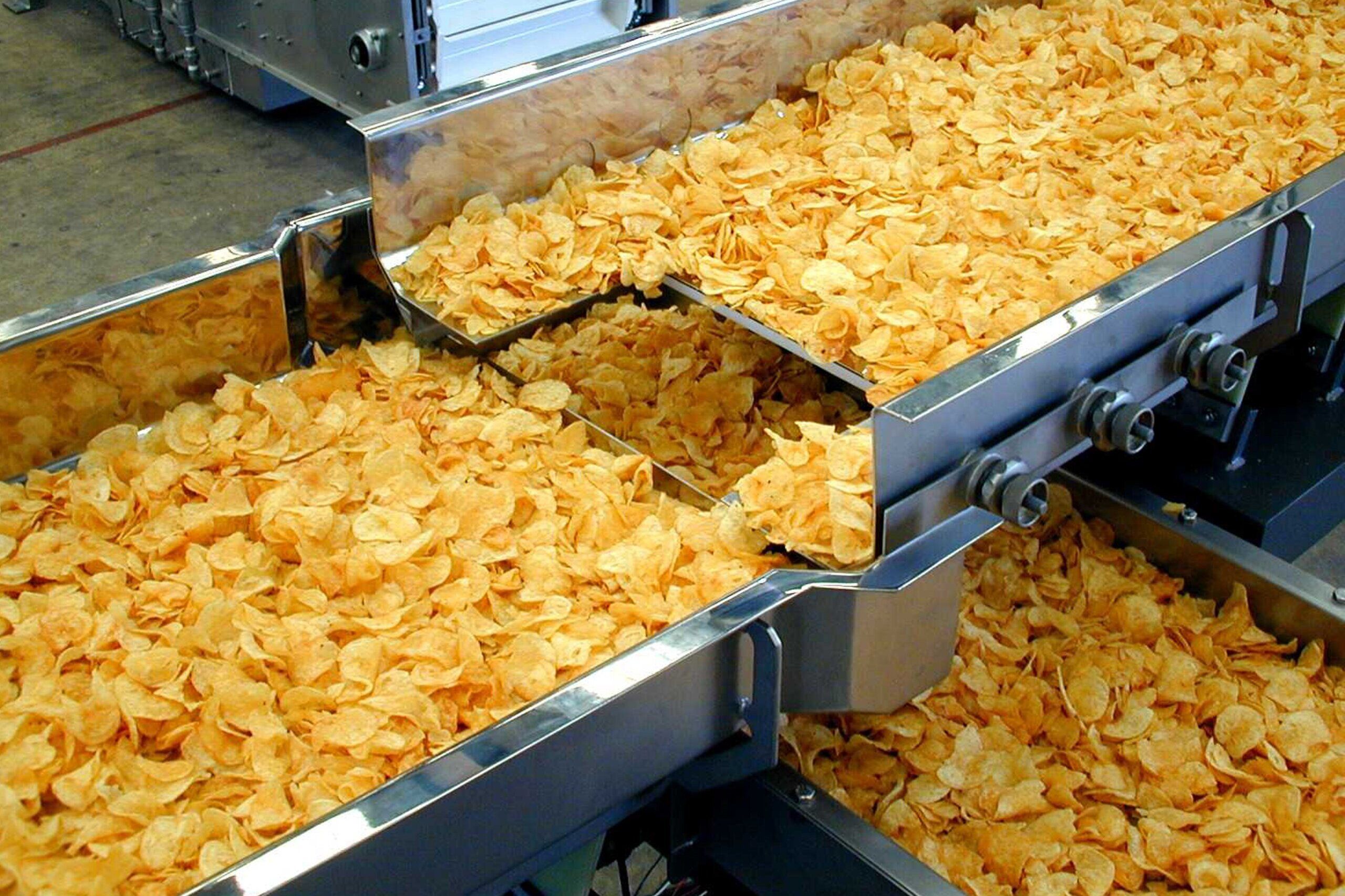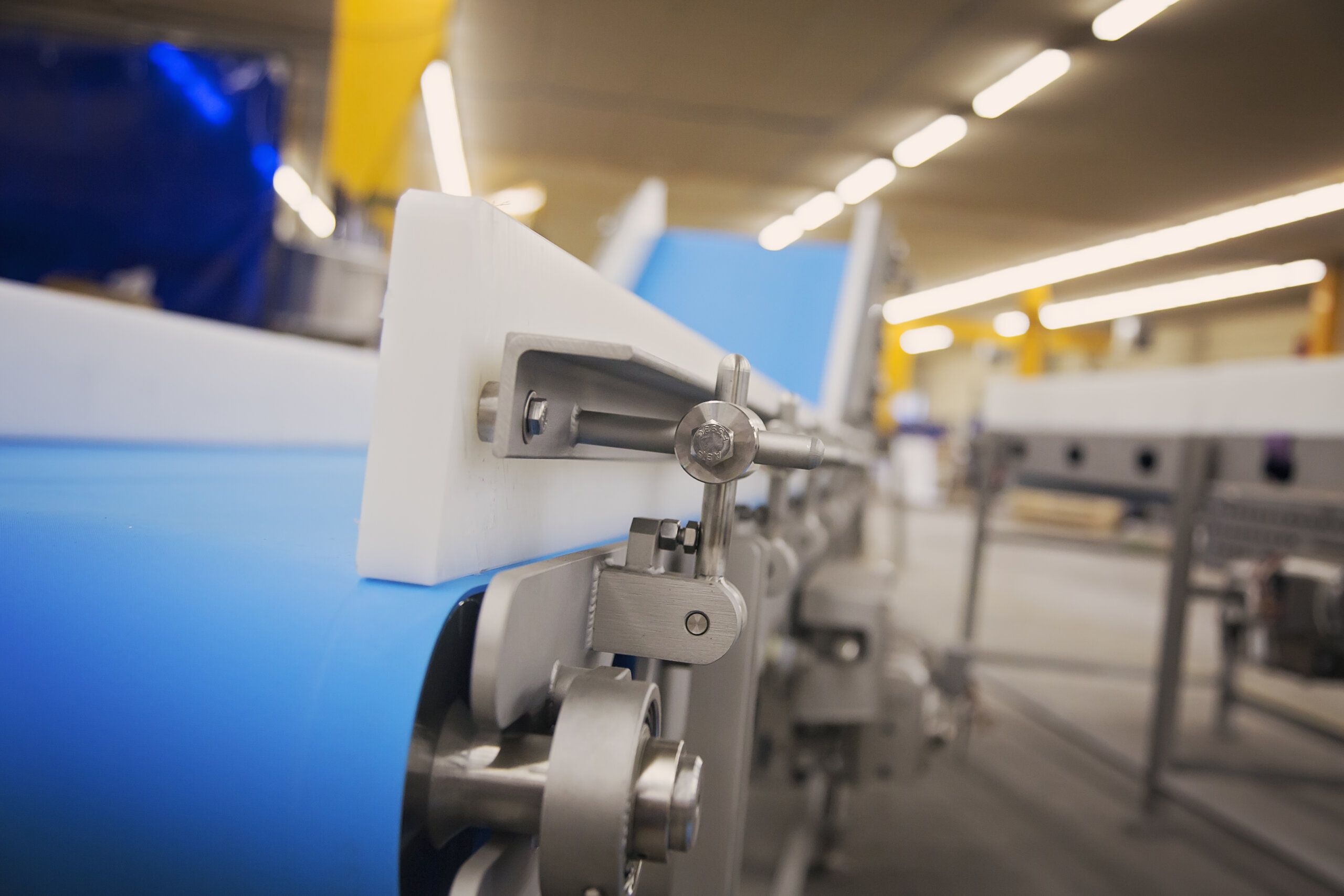Bucket Elevator Capacity for Various Sizes & Applications
There are many ways to lift food products, but bucket elevators remain a processing industry stalwart for one reason: an unmatched ability to meet producers where they are with simple, robust lifting capacity rightsized to their product, process, and pocketbook.
JUST THE LIFT YOU NEED: BUCKET ELEVATORS IN FOOD HANDLING
Whether you’re an artisan kitchen on the up or a global household name, bucket elevators provide safe, efficient lifting that respects your product, reduces waste, and delivers the throughput you need at a price you can afford.
Here, we take a look at the technology behind bucket elevators and specifically why they are so good at matching efficient lifting capacities to different levels of demand. Along the way, we’ll also look at the best applications for bucket elevators and calculate the bucket elevator design capacity you will need.
A WORKHORSE WITH PEDIGREE
Bucket elevators enable you to raise bulk products to elevated platforms and mezzanines using an “endless” series of overlapping containers or buckets on a vertically mounted chain loop system. It’s a simple design that comes with some big benefits.
Big Reach, Small Feet
Unlike almost any other lifting technology, bucket elevators can raise product to almost any practical height, and do this within a very small shop floor footprint. As height increases, there is also little or no increase in an elevator’s required footprint.
That makes bucket elevators an efficient and cost-effective way to add space and functionality to your facility, especially for drop-down applications like mix/blend systems, scales, and packaging that require additional height.
Straight Up Versatility
Bucket elevators also work pretty much the same, no matter how big or small they are. Their tried-and-true technology is also relatively easy to customize for your system’s specific needs.
That makes integration with other line equipment simpler. Experienced equipment providers like PFI can design horizontal, C, S, or Z-shaped elevators capable of accepting and distributing products in almost any configuration and with multiple discharge options for maximum flexibility.
Good bucket elevator equipment is also famously durable. With regular maintenance, some PFI conveyors are still running after upwards of 60 years on the job.
Strong but Gentle
Bucket elevators’ overlapping containers are designed primarily to lift dry bulk loose products while minimizing loss through spillage or degradation. V-shaped buckets minimize sticking and entrapment. When sized correctly for the application, they also protect brittle or friable foods from breakage.
As a result, bucket elevators are preferred for lifting a huge range of foods, including:
|
|
![]()
RIGHT SIZE, RIGHT PRICE
There is also no doubt about bucket elevators’ appetite for work. Machines equipped with fundamentally the same technology move loads as small as 135 cubic feet per minute and as large as 3,780 cubic feet.
That strength and versatility means affordable, game-changing lifting capacity at the scale that matters to your business. It’s powerful but right-sized to your specific needs.
Let’s take a closer look at how that works.
Calculating Bucket Elevator Capacity
Are you a bulk handler of raw staples like flour or rice, an added-value processor of cereals or mixed snacks, or a specialist in packaging delicate products like pasta or wrapped hard candy?
Even if your overall production capacities are the same, your throughput requirements in each case will be very different.
Here’s how to calculate bucket elevator capacity to meet your needs. There are several factors to be considered:
- Bucket Capacity: The overall volume of each bucket on your system in cubic feet is calculated from bucket width and depth.
- Bucket Spacing: The spacing between buckets on the elevator chain overlap which helps to avoid spillage.
- Chain Speed: The speed at which your elevator chain moves in feet per minute, depending on the strength of your system’s motors, the weight of your product, and how delicate it is.
From these measurements, elevator capacity can be calculated using this simple formula:
| Capacity = Bucket Capacity x Bucket Spacing x Belt Speed |
The result is the cubic feet per minute delivered by your elevator system. For example, for a system with buckets each holding two cubic feet of product spaced at one-foot intervals along a chain moving at 30 feet per minute, the overall capacity of the conveyor would be 60cfm.
Rightsizing Capacity
Every producer varies, of course, by the differing amounts of product that would fit into a given volume without excessive degradation or loss and by the number and weight of buckets that a system of a given power could safely handle.
The beauty of bucket elevators’ time-tested design and flexibility is the ability to customize almost any factor affecting its capacity to meet your needs, including the size and capacity of individual buckets, the number of buckets on a chain, and the speed of the chain itself.
And, with over 60 years of experience supplying vertical handling solutions worldwide, PFI knows how to deliver bucket elevator solutions built for maximum capacity at any scale.
Low, Medium, and High-Capacity Options
We deliver bucket elevators in low, medium, and high-capacity models. The elevator’s size determines the buckets’ width, which in turn, determines capacity. Height and speed also dictate capacity as do the food product’s weight and size.
Buckets are available in nine different capacities based on widths of 6, 9, 12, 15, 18, 24, 30, 36, and 48-inch widths to fit different frames, products, and application needs.
PFI designs stainless steel bucket elevator frames tailored to your bucket width, lift, and integration specifications. Where sanitary needs are highest, our frames include IP69K-compliant closed-casing tubing for maximum contamination protection.
Where needed, bucket elevator units can also be equipped with:
- Positive motion controls for smooth, rapid bucket movement to protect your product
- Sanitary clean-in-place (CIP) systems to maintain hygiene during operation
- Waste-reducing slide-out catch pans
More Bucket Options
PFI matches our equipment to your unique processing needs in other ways too. Our highly customizable buckets are designed to maximize both capacity and performance.
For example, most applications prefer our trusted standard v-shaped bucket shape for efficient emptying with minimal sticking and entrapment. However, we also offer:
- Optional ribbed surface texture for stickier foods
- Stainless steel, polycarbonate, and polyethylene to meet your specific sanitary, cleaning, and durability needs
- A wide choice of colored plastics
- Metal-detectable plastics for improved food safety
Up-Front Affordability, Long-Term Value
Bucket elevators’ scalable, flexible technology delivers hard-to-match performance at an unbeatable entry point. You’ll get the lifting power you need today to deliver on customer expectations or take your growing business up a notch.
In addition, few industrial solutions can match bucket elevators’ track record of reliability and long-term return on investment. When you invest in high-quality bucket elevator technology, you’re adding value to your operation by ensuring:
- Durability: Premium quality equipment from a reputable supplier can deliver decades of trouble-free service.
- Low maintenance: Simple technology, quality construction, and readily available parts keep long-term operating costs low.
- Low wastage: Properly designed and calibrated equipment minimizes food wastage over your equipment’s long life.
Flexible, affordable, and durable, bucket elevators offer the performance you need to aim higher and the long-term value you’ll need down the line.
![]()
IS A BUCKET ELEVATOR RIGHT FOR YOU?
The food industry is changing and there is more than one way to effectively lift dry or loose bulk foods up a level. So why stick with a “legacy” technology like bucket elevators?
Bucket elevators may not be ideal for every food product lifting application. The type of food you handle is important, as is connecting equipment and the layout of your facility. However, they make a lot of sense when you need a reliable, durable, and compact way to lift loads of almost any size.
In particular, bucket elevators’ tried-and-true design, scalability, and versatility can be a good fit for processors who:
- Handle very small or very large loads
- Process dry bulk foods, packaged goods, fresh produce, or frozen products
- Handle delicate, brittle, or friable foods
- Have limited space to add new equipment to the facility
To get the most out of your bucket elevator solution, it’s essential to invest in high-quality equipment that is optimized for your application. That’s why it’s critical to partner with an experienced, reliable food-handling partner like PFI, who can advise you on the ideal solution.
PFI: YOUR BUCKET ELEVATOR EXPERTS
PFI has been building, installing, and servicing bucket elevators for decades. As the leading supplier of safe, reliable, and durable conveying equipment to the global food processing market, we use our unparalleled experience and know-how to design and build better products.
Today, our fully customized bucket elevators offer unmatched lifting capacity in a minimal shop floor footprint and feature:
- Flexible configurations: Capacities, frames, and buckets to fit your application
- Optimal product handling: Minimal degradation, breakage, spillage, and sorting
- Trusted performance: We’ve been building long-lasting, low-maintenance bucket elevators for more than 60 years
- Service: Including installation, maintenance, training resources, and 24-hour support
Contact us today to find out how we can help you solve your food product handling challenges, or click below to learn more about our class-leading bucket elevator products.











